
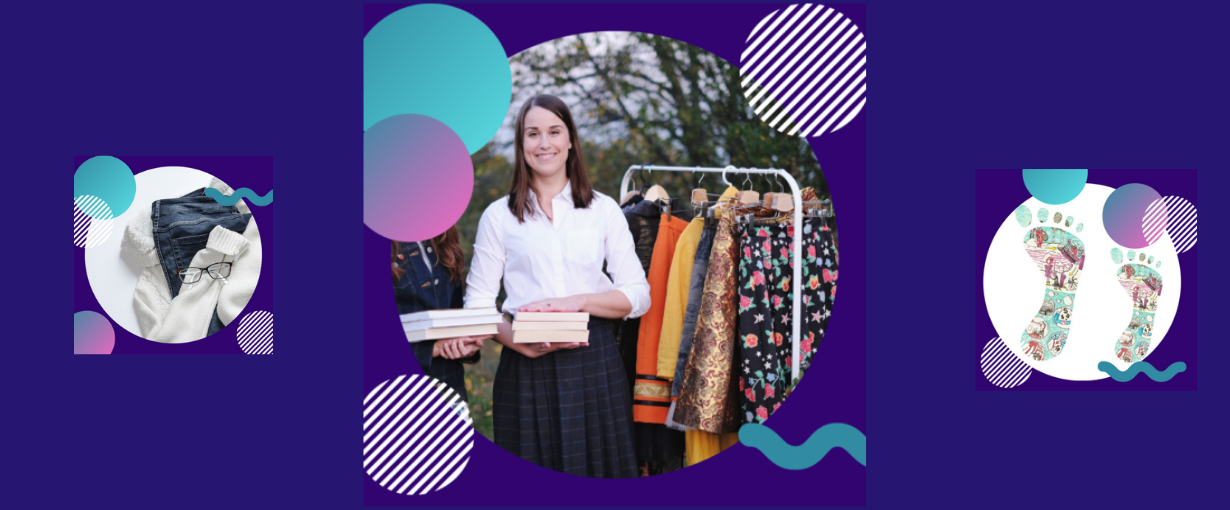
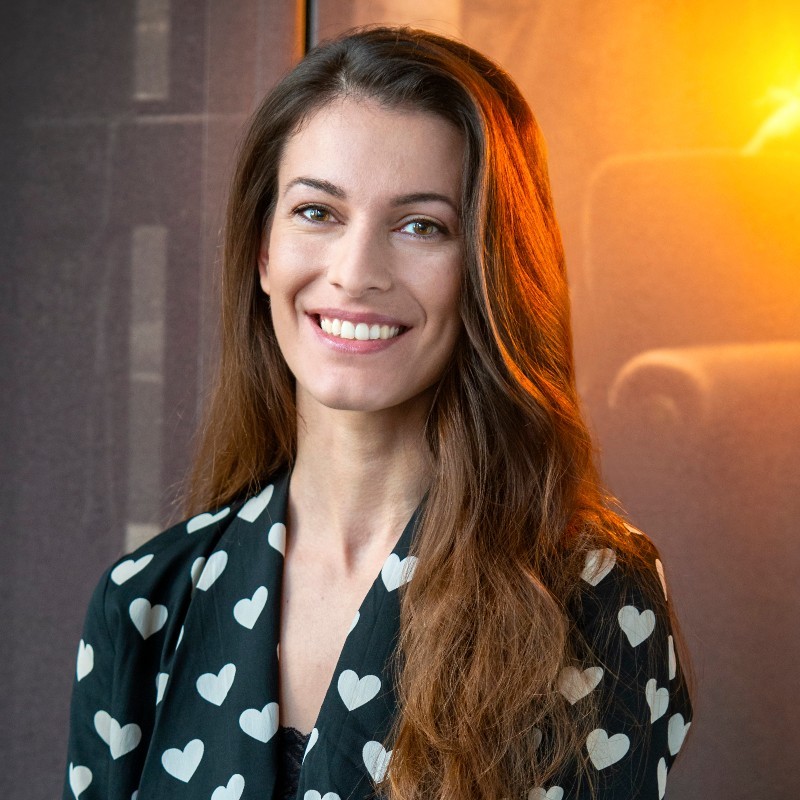
Let us introduce you, Dominika, young Slovak woman dedicated to topics of strategic philanthropy, project management and people management. In her free time, she drives the Šumné project focused on the rental of quality and local clothing. Šumné is striving for an alternative leading to sustainable clothing, saving natural resources and our wallets.
Dominika follows the motto: “Unless something is explicitly impossible, there must be a way to do it.” That is why she likes challenges and projects with which we can push not only our boundaries, but also the boundaries in a given area.
What does social entrepreneurship mean to you? How would you define it? Where did you first encounter this term?
I perceive social business as activity, where the main goal and motivation are not “green papers”, but the effort to bring positive change, whether in the social, environmental or other area. It means to me that the desire for real value exceeds monetary values and profits.
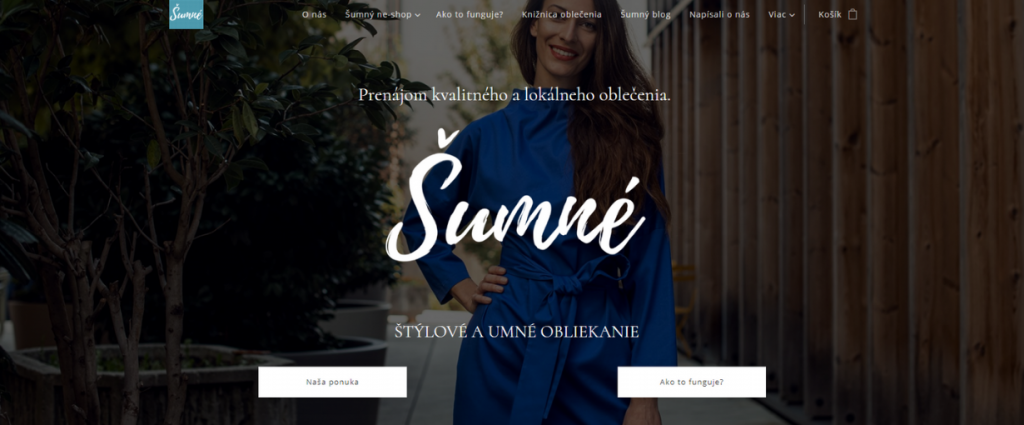
There are times when I feel like an alien among “business people” because of my point of view. However, I’m convinced that by undertaking an irresponsible business, we earn (instead of money) only a big trouble: rapid profits often create vast debts to our planet and to the environment, which will still have to be paid back at some point. It is already happening: the cost of coping with the environmental disasters, fires, long droughts, temperature fluctuations, sick people who work in terrible conditions and are a burden to the health care system etc. – we are already paying for this via our taxes …
I first encountered this concept at my work, Pontis Foundation, where we deal among others with the topics such as social innovation and responsible business. I draw a lot of inspiration from my work in developing Šumné.
How did you become an entrepreneur? What was your main motivation to start the business?
My main motivation was to do something positive in the clothing industry, to bring a real positive impact. I’m still not sure if I’m in business, but it’s probably normal for starting projects that we’re searching, trying and learning. My friend Eva and I came across a model of renting clothes abroad that was missing in Slovakia. And not just any rental, but quality clothes that are made in a sustainable and ethical way. Our vision is to bring more real quality and sustainability to our wardrobes – to offer clothes manufactured with least environmental and social impact.
Is Šumné your first business?
Šumné is my very first business experience. I grew up in the non-profit sector, from which I draw a lot of inspiration, especially in how to make a business ethical, to really monitor the impact and bring a real positive value. In a way, it is a complication, but I can’t imagine doing business that wouldn’t match my values. I wouldn’t be able to look at myself in the mirror.
Šumné supports local and quality clothing production in order to decrease the carbon footprint. How does this concept relate to social and ecological entrepreneurship?
We try to fulfill the ecological business concept mainly through the circular business model, i.e. to prevent the waste creation. This means that used clothes do not end up in a landfill or forgotten in a closet, but they return to market to the new customers. Basically, by providing the product as a service, it is in our best interest that the clothing we offer lasts as long as possible. If it is damaged, we repair it, sew it or we upcycle it and so on.
We try to use all available ecological alternatives in every aspect of our service – recycled packaging materials, ecological product delivery (bicycle couriers, public transport, public transport), ecological cleaning of clothes, etc. At the same time, we work with local suppliers and designers to support Slovak small and medium-sized businesses.
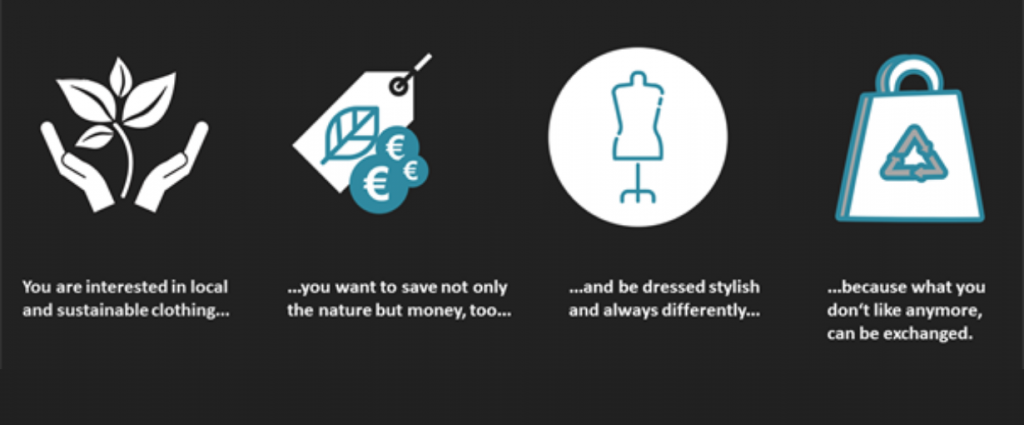
We are supporting the social and ecological entrepreneurship through the above-mentioned support of local businesses and at the same time we collaborate with clothing manufacturers who are committed to slow fashion ideas. This is not only about environmental aspects (use of quality natural materials, certified materials, recycled materials for clothing production), but we also see the fact that people who manufacture the clothes work in ethical, safe and healthy conditions and they are fairly rewarded for their work. All of our clothes are sewn in Slovakia by our home tailors. Obviously, there is much more that could be done; however, we are on the right way. There are many issues to be solved, such as high price of the certifications which the designers cannot afford because of the high costs.
What is the potential for social entrepreneurship of Slovak market compared to abroad?
I personally think that it is somehow good that Slovakia is a small country and the good ideas spread quickly here. What is a bit worse, is the overall purchasing power of the population. In too many cases is the price the most important decision criterion in our country, instead of the value itself. In Slovakia, there is a frequently used saying “we are not that rich to buy cheap things”, however, we rarely follow this motto. Meanwhile this saying is valid in other market segments, due to the “massaging” of the fast fashion chains, we pretend that the 5-euro T-shirt is a basic human right and whoever asks for more, just misuses the opportunity. I know, those are harsh words, but I know what I’m saying. I acted like this until recently. This is not a criticism of consumers, but of a savage market.
Where did you first present your business idea (event for start-ups or similar)? What was the hardest part in preparing the proper presentation at such an event? What would you recommend to starting entrepreneurs when developing their own social and ecologically beneficial ideas?
We presented our idea first time by posting on social networks, where it met with a great deal of support. However, this should be taken with a pinch of salt, since the majority were our friends and acquaintances. Later, we made a small Šumné stand at Dokola SWAP in Trenčín, where we used a questionnaire to find out about people’s opinions on our idea of renting the clothes.
I tell every beginning entrepreneur not to be afraid to take the first step – to go out on the market – at the beginning present it to closer friends and then among the unknown audience. People are often afraid that someone will “steal” the idea from them. Then I answer: “So let them. That means it’s a good idea. You can always be better. 😊 See how many similar or identical business concepts there are. You will never be the only one.” There is a saying embracing this fact: “Done is better than perfect.”
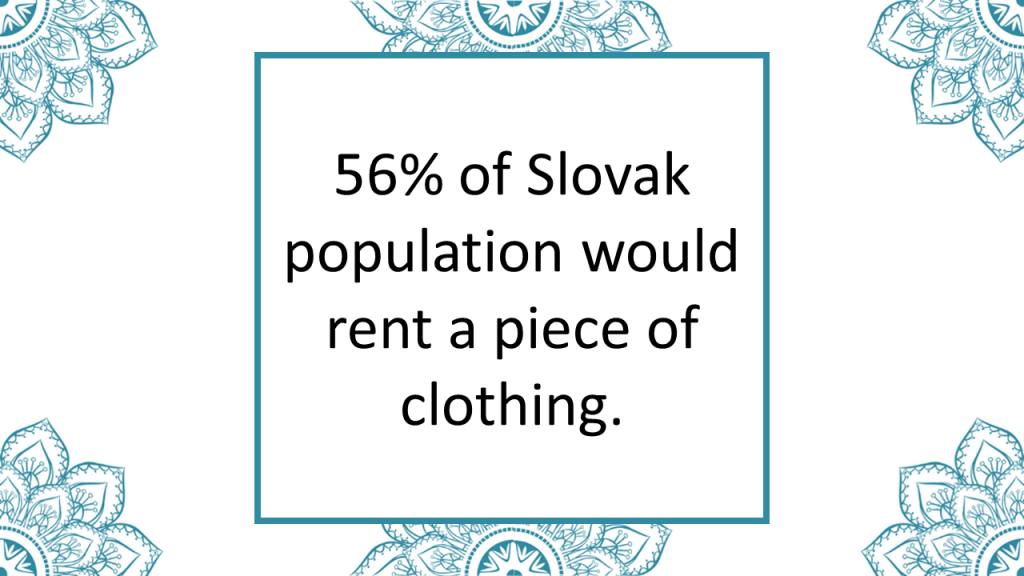
Many young people indicate as one of the barriers to starting the business the lack of missing capital or mentoring. How did you deal with this?
Evka and I both studied everything possible about start-ups and especially about the lean start-up approach. This approach means that you do not need to invest tens of thousands of euros in something that you would have to then completely readjust. In the beginnings we didn’t deal with capital that much and we took (and still take) it slowly. Obviously, we are slowly approaching the point where we will need more investment, but thanks to a slower start, we know exactly what works and into what we want to invest in the finances.
We picked our first mentors and counsellors from our smart friends and acquaintances. At a later stage we were provided with mentoring and consulting from organisations such as Impact HUB in Bratislava, Rozbiehátor and, last but not least, the Slovak Business Agency. We would like to thank them this way.
What was in your opinion the biggest barrier in the beginnings of Šumné? How did you overcome it?
We have never considered anything to be a barrier, we rather see it as a challenge or opportunity. Since Šumné is a relatively new concept, we had to set a lot of things from scratch: from trading conditions to the verification of the legislative framework. Maybe in the beginnings the biggest challenge was not to keep the idea in the drawer, but to launch it on the market with. And it paid off. Our idea brought positive feedback as well as constructive criticism or ideas, suggestions and questions that pushed us forward.
When starting Šumné, you released a questionnaire about fashion footprint. How did you manage to collect 1933 answers? Do you think it is because of the formulation or were people simply interested to learn more? Did you make changes to your business plan after receiving the results?
This particular questionnaire was an initiative within the Week of Fashion Revolution aimed at promoting sustainable, ethical and transparent fashion in contrast to fast fashion. At the time of launching the questionnaire, we had built friendships and contacts with related initiatives and brands, which were very happy to share our questionnaire. I would also recommend beginning entrepreneurs to never be afraid to write, address or visit other initiatives, companies or famous people with similar values. You have nothing to lose, you can only profit from it.
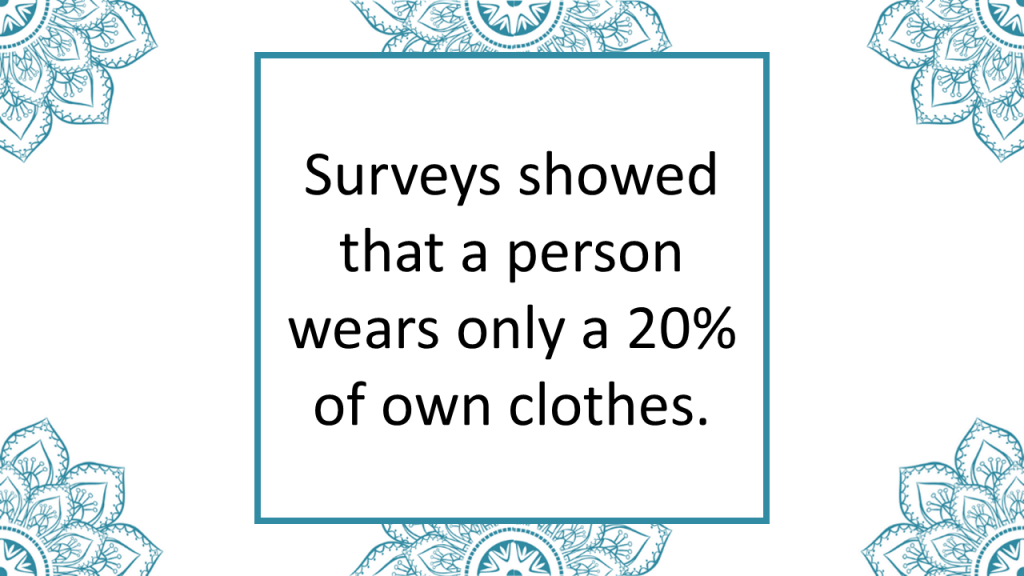
What is the Clothing library and how does it work? How are you succeeding with filling it?
As the name suggests, you will not find any books in the Clothing Library – you will be able to borrow clothes that have been purchased, worn and loved, but no longer serve their owner. The Clothing Library will operate on a similar principle as book libraries. However, instead of books, people will be able to pay the membership fee to borrow clothes that have been donated to the Clothing Library. Of course, we will regularly add, sort, repair, professionally clean and iron the clothes so that they always reach customers clean and without defects. The Clothing Library is currently in test operation with its first members.
Donated clothing, which we will not be able to provide for rent, will be passed on to sheltered centres, second hands, or sent for upcycling, where we will resew it or otherwise adjust it to a new model, which we will send back into circulation thus extending the life of donated piece.
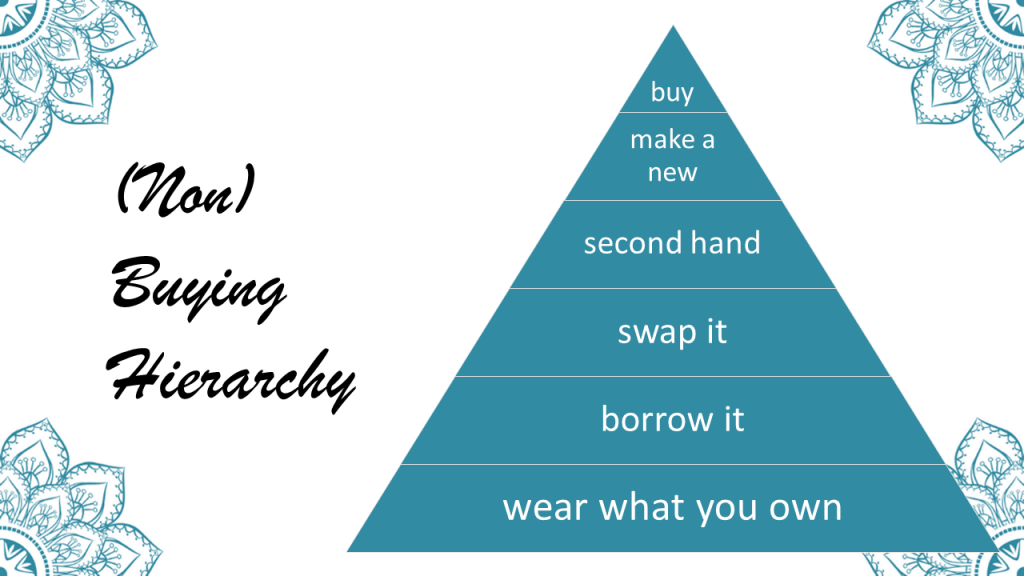
What is your message for young people willing to start a social and ecological enterprise?
Get started! And more importantly persist – something takes months, something takes years, something decades.
What makes Šumné successful? What are the pillars of successful social entrepreneurship?
The question is how do you define success. We are not yet a 100% established business, we have a long way to go. Is it a success?
But even the very path we are walking on (now I sound like a Buddha) is a success. Every day we learn something new, people talk and write about us and our ideas. And that’s the best thing. I think the biggest advantage of Šumné is that we do it with our hearts, out of conviction and authentically.
What are your development plans for Šumné in the upcoming period?
Last year we were slowed down in many aspects by the pandemic, at the same time we were not bored at all and we worked perhaps more than ever before. In particular, we reshaped the communication strategy, business model and processed (and still process) thousands of kilograms of beautiful but unworn clothing that people donated to the Clothing Library. At the turn of the year we launched a test store, so that we could broaden the member base of the Clothing Library.
Mladiinfo Slovensko organized also a live discussion with Dominika, Petra Rendková and Martin Vasko.
You can watch the stream recording on facebook.
